| Source (Hebrew) | Translation (English) |
|---|---|
|
אָשִׁירָה וַאֲזַמְרָה לֵאלֹהֵי בְּעוֹדִי
הָאֱלֹהִים הָרוֹעֶה אוֹתִי מֵעוֹדִי |
I will sing songs to my God while I yet have being—
God who has shepherded me since I have been. |
|
עַד הַיוֹם הַזֶּה הֶחֱזַקְתָּ בְּיָדִי
חַיִּים וָחֶסֶד עָשִׂיתַ עִמָּדִי |
Until this day you have held fast hold of my hand;
life and lovingkindness have you given to me. |
|
בָּרוּךְ יְיָ וּבָרוּךְ שֵׁם כְּבוֹדוֹ
כִּי עַל עַבְדּוֹ הִפְלִיא חַסְדּוֹ |
Blessed be the Lord, and blessed be Their glorious Name;
for unto Their servant Their mercy is wonderful. |
|
אֱלֹהֵי מָרוֹם בַּמָּה אֲקַדֵּם
וּבַמָּה אִכַּף לֵאלֹהֵי קֶדֶם |
How shall I come before God, the most high?
and how shall I bow before the God of old? |
|
אִלּוּ הָרִים הֵם לְמַעֲרָכָה
וְכׇל עֲצֵי לְבָנוֹן בַּכַֹל עֲרוּכָה |
If the mountains were an altar,
and all the wood of Lebanon were laid thereon; |
|
וְאִם כׇּל בְּהֵמוֹת וְחַיּוֹת קְרוּצִים
נְתָחִים עֲרוּכִים עַל הָעֵצִים |
If all domesticated and wild herds[1] original translation has “cattle and all beasts” were slain,
prepared, and laid upon the wood; |
|
וְאַף זָוִיּוֹת מִזְבֵּחַ מְבוּסִים
דָּם כַּמַּיִם לַיָּם מְכַסִּים |
And if blood covered the corners of the altar,
as the waters cover the sea; |
|
וְכַחוֹל סֹלֶת דָשֵׁן וְשָׁמֵן
בָּלוּל בְּרִבֲבוֹת נַחֲלֵי שָׁמֶן |
If fine flour, rich and abundant as sand,
were mingled with ten thousand rivers of oil; |
|
וּלְאַזְכָּרָה לְבוֹנָה וְסַמִּים
וְלִקְטֹרֶת כׇּל רָאֹשֵׁי בְשָׂמִים |
And for a memorial, frankincense
and spices, yea, all the chief spices; |
|
וְאִלּוּ נֵרוֹת עַל הַמְּנוֹרוֹת
יִהְיוּ מְאִירוֹת כִּשְׁנֵי הַמְּאוֹרוֹת |
If the flames on the menorot[2] original translation has “lights on the lamps”
were radiant as the two great luminaries; |
|
וּכְהַרֲרֵי אֵל לֶחֶם הַפָּנִים
עַל שֻׁלְחָנוֹת עֲרוּכִים בְּפָנִים |
And if the shew-bread, arranged
upon tables within, were like high mountains; |
|
וְיַיִן כְּמוֹ מְטַר הַשָּׁמַיִם
וְשֵׁכָר לְנֶסֶךְ כְּעֵינוֹת מָיִם |
And if for drink-offering there were wine like the rain of heaven,
and strong drink abundant as fountains of water; |
|
וְאִלּוּ כׇּל בְּנֵי אָדָם כֹּהֲנִים
לְוִיִּם מְשׁוֹרֲרִים בִּכְנַף רְנָנִים |
If all the sons of men were Kohanim;
Levi’im chanting like winged songsters; |
|
וְכׇל עֲצֵי עֵדֶן וְכׇל עֲצֵי יְעֲרִים
לְכִנּוֹרוֹת וּנְבָלִים לְשִׁירִים |
And all the trees of Eden and all the trees of the forests
were harps and viols for the singers; |
|
וְכׇל בְּנֵי אֱלֹהִים בְּקוֹל תְּרוּעָתָם
וְהַכּוֹכָבִים מִמְּסִלּוֹתָם |
If all the angels gave their voice in song
and the stars did sing from their courses— |
|
וְכׇל הַלְּבָנוֹן וְחַיָּה כֻּלָּהּ
אֵין דֵּי בָעֵר וְאֵין דֵּי עוֹלָה |
All Lebanon would not suffice for fuel,
nor all its wild herds[3] original translation, “beasts” for burnt-offering— |
|
הֵן בְּכׇל אֵלֶּה אֵין דֵּי לַעֲבוֹד
וְאֵין דֵּי לְקַדֵּם לְמֶלֶךְ הַכָּבוֹד |
Lo! all these were not enough to serve,
to come therewith before the God of glory. |
|
כִּי נִכְבַּדְתָּ מְאֹד מַלְכֵּנוּ
וּבַמֶּה נִכַּף לַאֲדֹנֵנוּ |
For you, our King, are exceeding glorious:
how then should we bow down before our Lord? |
|
אָמְנָם לֹא יוּכְלוּ כַבְּדֶךָ
כׇּל חַי אַף כִּי אֲנִי עַבְדֶּךָ |
Verily none living can honour you—
how then can I, your servant? |
|
וַאֲנִי נִבְזֶה וַחֲדַל אִישִׁים
נִמְאָס בְּעֵינַי וּשְׁפַל אֲנָשִׁים |
Seeing I am despised and least of human beings,
contemptible in mine own eyes, and lowly among humanity; |
|
וְאֵין לְעַבְדְּךָ כֹּל לִכַבְּדֶךָ
לְהָשִׁיב גְמוּל לְךָ עַל חֲסָדֶיךָ |
And your servant has naught wherewith to honour you,
to render unto you for all your loving-kindness. |
|
כִּי הִרְבִּיתָ טוֹבוֹת אֵלָי
כִּי הִגְדַּלְתָּ חַסְדְּךָ עָלָי |
For you have multiplied good things towards me—
for you have magnified your mercy unto me. |
|
וְרַב שִׁלּוּמִים לְךָ חֻיַּבְתִּי
כִּי עָשִׂיתָ טוֹבוֹת אִתִּי |
Great are the debts I owe you
for the good you have wrought for me. |
|
וְלֹא חֻיַּבְתָּ לִּי גְּמוּלֶךָ
כׇּל טוֹבָתִי בַּל עָלֶיךָ |
But you owe no debt of benefit to me;
for you need not to bestow aught upon me. |
|
עַל הַטּוֹבוֹת לֹא עֲבַדְתִּיךָ
אַחַת לְרִבֹּא לֹא גְמַלְתִּיךָ |
I have not served you in accordance with your benefits;
one in ten thousand I have not repaid you. |
|
אִם אָמַרְתִּי אֲסַפְּרָה כְמוֹ
לֹא יָדַעְתִּי סְפוֹרוֹת לָמוֹ |
If I say, I will declare their number,
I know not how to count them. |
|
מָה אָשִׁיב לְךָ וְהַכֹּל שֶׁלָּךָ
לְךָ שָׁמַיִם אַף אֶרֶץ לָךְ |
And what shall I return unto you, seeing that all is yours?
yours are the heavens, and the earth also is yours. |
|
יַמִּים וְכׇל אֲשֶׁר בָּם בְּיָדֶךָ
וְכֻלָּם יִשְׂבְּעוּן מִיָּדֶךָ |
The seas and all that is within them are in your hand,
yea, and out of your hand all these are satisfied. |
|
וַאֲנַחְנוּ עַמְּךָ וְצֹאנֶךָ
הַחֲפֵצִים לַעֲשׂוֹת רְצוֹנֶךָ |
We are your people and your sheep,
who delight to obey your will. |
|
וְאֵיךְ נַעֲבֹד וְאֵין לְאֵל יָדֵנוּ
וְלִשְׂרֵפַת אֵשׁ בֵּית מִקְדָּשֵׁנוּ |
But how shall we serve, since our hand has no power,
and our sanctuary is burnt with fire? |
|
וְאֵיךְ נַעֲבֹד וְאֵין זֶבַח וּמִנְחָה
כִּי לֹא בָאנוּ אֶל הַמְּנוּחָה |
How shall we serve without animal sacrifice and grain offering[4] original translation has “sacrifice and meat offering” ?
for we are not yet come unto our rest. |
|
וּמַיִם אַיִן לְהַעֲבִיר טֻמְאָה
וַאֲנַחְנוּ עַל אֲדָמָה טְמֵאָה |
Neither is there water to wash away defilement;
lo! we are upon unpurified ground. |
|
שָׂשׂ אָנֹכִי עַל אֲמָרֶיךָ
וְהִנֵּה בָאתִי בִּדְבָרֶיךָ |
But I rejoice at your word,
and I am come according to your bidding; |
|
כִּי כָתוּב לֹא עַל זְבָחֶיךָ
וְעוֹלֹתֶיךָ אוֹכִיחֶךָ (תהלים נ:ח) |
For it is written: I will not reprove you for your sacrifices,
or your burnt offerings. (Psalms 50:8) |
|
עַל דְּבַר זֶבַח וְעוֹלוֹתֵיכֶם
לֹא צִוִּיתִי אֶת אֲבוֹתֵיכֶם |
Concerning your sacrifices and your burnt offerings
I commanded not your fathers. |
|
מַה שָּׁאַלְתִּי וּמַה דָּרַשְׁתִּי
מִמְּךָ כִּי אִם לְיִרְאָה אוֹתִי |
What have I asked, and what have I sought of you
but to fear me? |
|
לַעֲבוֹד בְּשִׂמְחָה וּבְלֵבָב טוֹב
הִנֵּה שְׁמֹעַ מִזְּבַח טוֹב |
To serve with joy and a good heart;
behold, to hearken is better than sacrifice, |
|
וְלֵב נִשְׁבָּר מִמִּנְחָה טְהוֹרָה
זִבְחֵי אֱלֹהִים רוּחַ נִשְׁבָּרָה |
And a broken heart than a pure offering.
The sacrifices of God are a broken spirit.[5] Psalms 51:18-19 |
|
זֶבַח וּמִנְחָה לֹא חָפַצְתָּ
חַטָּאת וְעוֹלָה לֹא שָׁאָלְתָּ |
In animal sacrifice and grain-offering you delight not;
sin-offering and burnt-offering you have not asked. |
|
מִזְבַּח אֲבָנִים בְּשָׂרִי וְלִבִּי
וַאֲשַׁבְּרָה אֶת רוּחִי בְּקִרְבִּי |
I will build an altar of the broken fragments of my heart,
and will break my spirit within me. |
|
רוּם לֵב אַשְׁפִּיל וְאַף רוּם עֵינָי
וְאֶקְרַע לְבָבִי לְמַעַן אֲדֹנָי |
The haughty heart I will humble, yea, the haughtiness of mine eyes;
and I will rend my heart for the sake of the Lord. |
|
שִׁבְרֵי לִבִּי הֵם זְבָחֶיךָ
יַעֲלוּ לְרָצוֹן עַל מִזְבְּחֶךָ |
My broken spirit—that is your sacrifice;
let it be acceptable upon your altar. |
|
וְאַשְׁמִיעַ בְּקוֹל הֲוָיוֹתֶיךָ
וַאֲסַפְּרָה כׇּל נִפְלְאוֹתֶיךָ |
I will proclaim aloud your praise,
I will declare all your wonders. |
|
אֲשֶׁר יָדְעָה נַפְשִׁי אַחְבִּירָה
אֲמַלֵּל גְּבוּרוֹת וַאֲדַבֵּרָה |
That which my soul knows I will tell;
I will speak and declare your mighty acts. |
|
וּמָה אֶעֱרֹךְ וְלֹא יָדַעְתִּי מָה
הֲיָכוֹל אוּכַל דַּבֵּר מְאוּמָה |
But what should I set forth, when I know naught?
Lo! is there anything that I can utter? |
|
כִּי אֵין חֵקֶר לִגְדֻלָּתוֹ
כִּי אֵין מִסְפָּר לִתְבוּנָתוֹ |
For there is no searching out Their greatness,
and Their understanding is beyond measure. |
|
חֲכַם לֵבָב מִי כָמוֹהוּ
שַׂגִּיא כֹחַ לֹא מְצָאנוּהוּ |
Wise of heart, who is like unto Them?
Mighty in strength, we cannot comprehend Them. |
|
עוֹשֶׂה גְדוֹלוֹת וְרַב נוֹרָאוֹת
גָּדוֹל אַתָּה וְעוֹשֵֹה נִפְלָאוֹת |
Doing great things and abundant in marvels,
you are great and work wonders |
|
עַד אֵין מִסְפָּר וְעַד אֵין חֵקֶר
וְלֹא נוֹדַע כִּי לֹא יֵחָקֵר |
That are without number, yea, they are not to be searched out;
neither can they be understood, for they are inscrutable. |
|
אֵיזוֹ עַיִן אֲשֶׁר תְּעִידֶךָ
וְאֵיזֶה פֶּה אֲשֶׁר יַגִּידֶךָ |
Where is the eye that can testify of you?
and where is the mouth that can tell of you? |
|
חַי לֹא רַאֲךָ וְלֵב לֹא יְדָעֶךָ
וְאֵיזֶה שֶׁבַח יַצִּיעֶךָ |
None living has seen you, and no heart knows you;
then where is the praise that shall comprehend you? |
|
גַּם מְשָׁרְתֶיךָ לֹא רָאוּךָ
וְכׇל חַכְמֵי לֵב לֹא מְצָאוּךָ |
Even your ministering angels have not seen you,
neither can the wise of heart perceive you. |
|
אַתָּה לְבַדְּךָ מַכִּיר שִׁבְחֶךָ
וְאֵין זוּלָתְךָ יוֹדֵעַ כֹּחֶךָ |
You alone know your praise,
and none beside you has knowledge of your strength, |
|
וְאֵין יוֹדֵעַ בִּלְעָדֶיךָ
שְׁבָחוֹת רְאוּיוֹת לִכְבוֹדֶךָ |
And none knows beside you
the praises befitting your glory. |
|
עַל כֵּן תְּבֹרַךְ כָּרָאוּי לָךָ
כְּפִי קָדְשָׁךְ כְּפִי כְּבוֹדָךְ וְגָדְלָךְ |
Therefore may you be blessed as it befits you,
according to your holiness, your glory and your greatness; |
|
וּמִפִּי הַכֹּל כְּכׇל אֱיָלוּתָם
כְּפִי מַדָּע אֲשֶׁר אַתָּה חֲנַנְתָּם |
Yea, from the mouth of all, with their whole strength,
according to the knowledge wherewith you have graciously endowed them. |
|
יוֹדוּ פִלְאֲךָ הַשָׁמַיִם
וִיאַדְּרוּךָ קוֹלוֹת מָיִם |
The heavens shall acknowledge your wonders,
and the voice of the waters shall glorify you. |
|
וְיָרִיעוּ לְךָ כׇּל הָאָרֶץ
יוֹדוּךָ כׇּל מַלְכֵי אָרֶץ |
And all the earth shall shout unto you,
and all the kings of the earth shall give thanks unto you. |
|
אַף יוֹדוּךָ כׇּל הָעַמׇּים
וִישַׁבְּחוּךָ כׇּל הָאֻמִּים |
Yea, all the people shall give thanks unto you,
and all the nations shall praise you; |
|
כׇּל זֶרַע יַעֲקֹב עֲבָדֶיךָ
כִּי עָלֵיהֶם גָּבְרוּ חֲסָדֶיךָ |
And all the seed of Yaaqov, your servant;
for upon them have your loving-kindnesses been exceeding great— |
|
אֶת שֵׁם יְיָ יְהַלְלוּ כֻלָּם
אֵל אֱלֹהִים אֱמֶת וּמֶלֶךְ עוֹלָם׃ |
They all shall praise the Name of the Lord
God, the true God and everlasting King. |
This is the shir ha-yiḥud l’yom rishon (hymn or song of unity for the first day), as translated by Nina Salaman and published in the maḥzor for Yom haKippurim by Arthur Davis and Herbert Adler (1904). I have made changes to the translation, mainly to update archaic language and disambiguated terms for animals and Temple offerings. I’ve also replaced male default language for God with gender inclusive terms. The transcription of the shir published here is based first on the unvocalized text found in Lia van Aalsum’s dissertation, “Lied van de eenheid. Een onderzoek naar de bijbelse intertekstualiteit van het spirituele geschrift Sjier haJichoed” (2010), pp. 42-44. Dr. Van Aalsum’s transcription was itself derived from the published transcription of Abraham Meir Habermann (Mosad haRav Kook: 1948) based on a commentary on the Shir haYiḥud by Rabbi Yom Tov Lipmann Muelhausen (Thinegen 1560) republished in a facsimile edition in 1982 by Joseph Dan. I have revocalized the text according to A.M. Habermann’s work. –Aharon Varady
In his introduction to a facsimile edition of the Shir haYiḥud published by Joseph Dan in 1982, the scholar writes:
“Shir ha-Yiḥud”, “The Hymn of Divine Unity”, is a theological poem, composed in Central Europe in the second half of the 12th century by a Jewish theologian or mystic who probably belonged to the sect of the Ashkenazi Ḥasidim (Jewish-German Pietists). This poem became one of the most famous poetic works to be included in the Jewish prayer-book, and had great impact upon the development of theological poetry in Hebrew. To some extent it can be compared to the famous “Keter Malchut” by Rabbi Shlomo ben Gevirol; both poems gave expression to the deepest religious attitudes found in the Jewish cultures which created them.
“Shir ha-Yiḥud” is an anonymous poem, even though some editions, including the one reproduced here, attribute it to the leader of the Ashkenazi Ḥasidic movement, Rabbi Judah ben Samuel the Pious, who lived in Spyer and Regensburg in the second half of the 12th century and the beginning of the 13th (died in 1217). In one of the esoteric theological works of Rabbi Judah, written circa 1200, this poem is quoted, and attributed to a “poet”, as if it were an old, well-known work of liturgy (Ms. Oxford 1567, 4b-5a). This could be seen as conclusive evidence that Rabbi Judah did not write this poem, for an author does not, usually, quote his own work in this way. However, the possibility that Rabbi Judah was the author should not be rejected off-hand. It is a fact that Rabbi Judah insisted, in his ethical works, that books and hymns shouid be published anonymously, for the inclusion of the author’s name in them might cause his descendants to commit the sin of pride. We do not have works by Rabbi Judah signed by him, and it seems that he himself scrupulously observed this maxim, though even his closest disciple, Rabbi Eleazar of Worms, did sign all his work in his full name. In the same theological treatise Rabbi Judah quoted “Sefer Ḥasidim”’, his major ethical work, several times, as an anonymous work. However, we do lack a positive indication that proves him to be the author. It seems that by the thirties of the 13th century no clear tradition existed in Germany concerning the authorship of the hymn. In Rabbi Moses Taku’s polemical work, “Ketav Tamim”, the hymn is mentioned twice and attributed to “Rabbi Bezalel and Rabbi Samuel’, and it is evident that Rabbi Moses did not know anything about the author of the work.
The theology of the Shir ha-Yiḥud is based to a very large extent on the text of Rav Saadia Gaon’s Book of Beliefs and Ideas, but not on the original text (in Arabic) or the standard 12th century translation by Rabbi Judah ben Tibbon, but on an early paraphrase of the work, probably made in the 11th century. This paraphrase transformed Rav Saadia’s philosophical treatise into a poetic description of God’s greatness, and several passages of such descriptions were included in the “Shir ha-Yiḥud” almost verbatim. The author in medieval Germany used Saadia’s material to introduce to his own community some basic concepts concerning the creation and the nature of God, emphasizing his remoteness from any corporeal description and insisting especially on the divine immanence throughout the cosmos. Rabbi Moses Taku’s criticism of the work concentrated on this aspect of the hymn’s theology, for Rabbi Moses objected to the new, philosophical attitude towards God which began to spread in the Jewish community in Germany at that time, mainly through the teachings of the Ashkenazi Ḥasidim.
The Shir ha-Yiḥud is the first step in the evolvement of a whole literary genre, which developed in Germany in the 13th century and produced nearly a score of treatises, most of them including the term “Yiḥud” (divine unity) in their titles. These works, written by the Ashkenazi Hasidim, popularized the theology influenced by Saadia, insisting on divine transcendence and immanence at the same time, rejecting anthropomorphic concepts of God and explaining divine revelation in non-corporeal terms. These works were written in prose, leaving Shir ha-Yiḥud as one of the very few examples of Jewish theology of this period expressed in poetic form. One more example, however, is published here — a theological poem which was written in a circle of Jewish mystics late in the 12th century, which was included in several works, among them those of Rabbi Elhanan ben Yaqar of London (middle of the 13th century). This poem was probably written in order to serve as a basis for a theological exegesis, for, unlike Shir ha-Yihud, it is brief and cryptic. These two examples serve, however, to demonstrate the role that poetry played in the emergence of Jewish esoteric and mystical literature in Central Europe.
Source(s)

Shir haYihud l’Yom Rishon (Thinegen 1560 [facsimile]), p. 3 Shir haYihud l’Yom Rishon (Thinegen 1560 [facsimile]), p. 4 Shir haYihud l’Yom Rishon (Thinegen 1560 [facsimile]), p. 5 Shir haYihud l’Yom Rishon (Thinegen 1560 [facsimile]), p. 6 Shir haYihud l’Yom Rishon (Thinegen 1560 [facsimile]), p. 7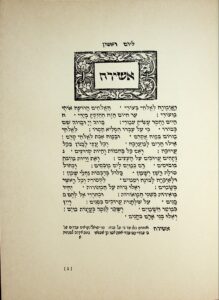
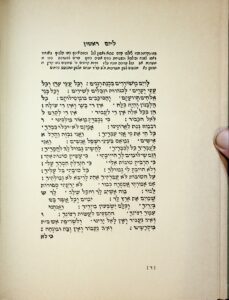
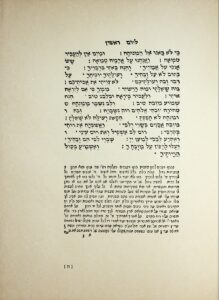
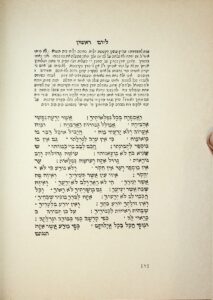
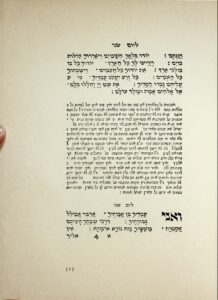



![Shir haYihud l’Yom Rishon (Thinegen 1560 [facsimile]), p. 3 – crop](https://opensiddur.org/wp-content/uploads/2025/08/shir-hayihud-lyom-rishon-thinegen-1560-facsimile-p--3-crop.jpg)